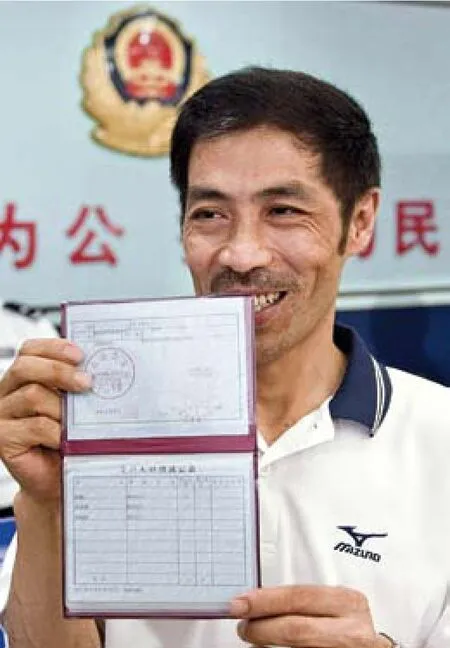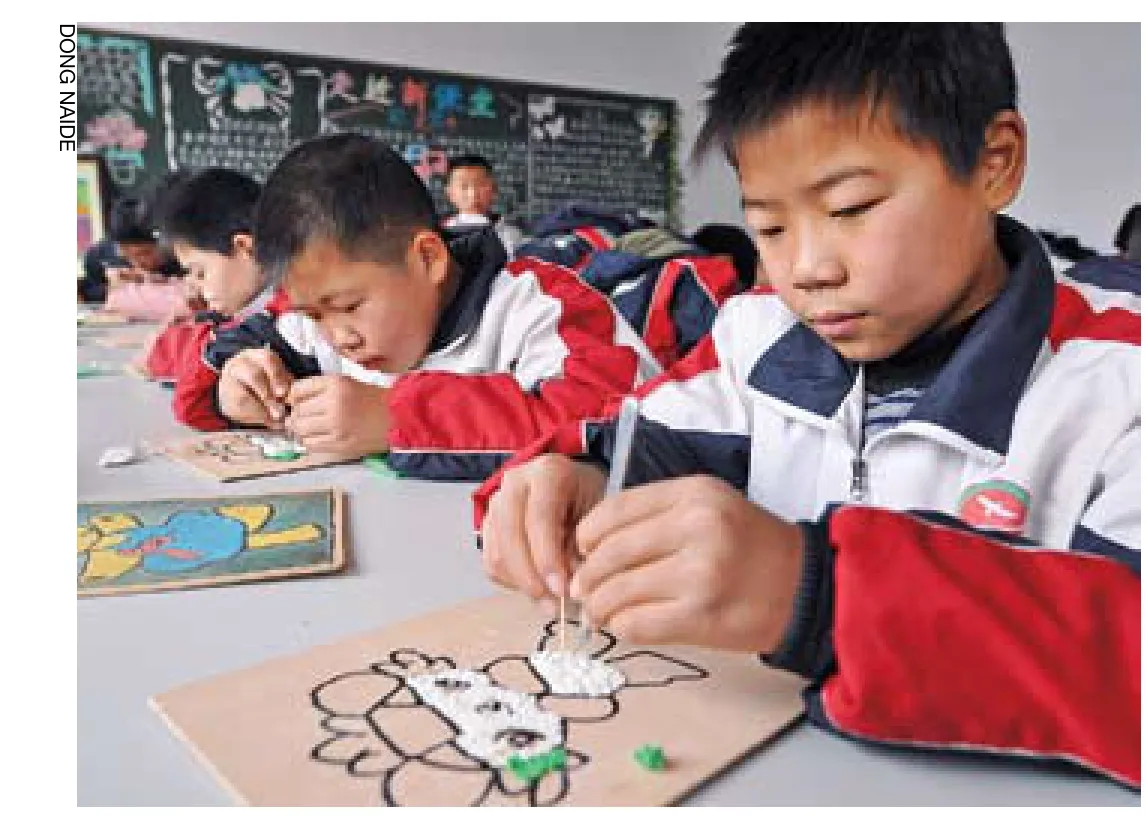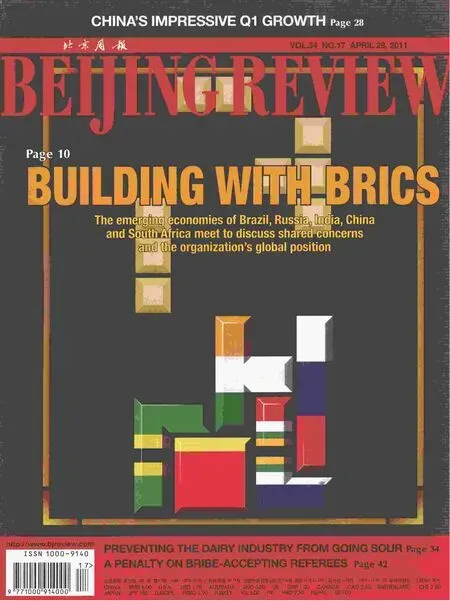Breaking The Bondage
2011-10-14ByYINPUMIN
By YIN PUMIN
Breaking The Bondage
By YIN PUMIN
China’s pioneer project of reforming itshukousystem starts

YANG LEI
All non-urban workers in Chengdu, southwest China’s Sichuan Province, were covered by social security on April 1. The action was regarded as one of the most important measures taken by the Chengdu Municipal Government to reform its household registration, orhukou, system.
“It ensures non-urban workers the right to enjoy the same social insurance as their urban peers,” said Zhang Xiaojiang, Vice Director of Chengdu Municipal Bureau of Human Resources and Social Security. “From now on, Chengdu will not differentiate farmers from urban residents and the phrase ‘migrant worker’ will not exist any more.”
An outdated system
Set up in 1958, China’shukousystem was meant to control the movement of people between urban and rural areas. Under the system, rural residents who move to cities cannot change theirhukoustatus and therefore have little access to social welfare in cities such as education, medical care, housing or employment, regardless of how long they may have lived or worked in the city.
“Hukouhas played an important role as a basic data provider and for identification registration in certain historical periods, but it has become neither scientifc nor rational given the irresistible trend of migration,” said Duan Chengrong, Director of the Research Center for Population and Development at the Renmin University of China.
Zhang Chewei, Vice Director of the Institute of Population and Labor Economics at the Chinese Academy of Social Sciences (CASS), said, “As migrant laborers have made their contributions to urban development, they should also be given fair treatment when it comes to social benefts.”
Besides the unfair treatment, Duan believes that thehukousystem is also an obstacle to the market economy. “The trend is toward eliminating it,” he added.
Duan said that while thehukousystem has failed to stop the infux of rural dwellers into the cities, it has impeded their integration into those areas and their access to the most prized jobs.
“Hukoureforms therefore could allow China to channel labor to where it is most needed, rather than to areas most popular among the labor pool,” Duan said. “More equality in the availability of urban education and healthcare should be granted for all workers and their families, while more rural townships need to provide useful public services so that there would not be so many people yearning to move to cities.”
China’s 12th Five-Year Plan (2011-15), which was approved this year, lays out a plan to set up a mechanism to offer equal public services to people in urban and rural regions.
“During the period, the country should make it a priority to ensure that the transfer of labor and rural land can be made according to law and market rules so that farmers can have better lives in cities and land can be used in a more effcient way,” said Dang Guoying, a researcher with the Rural Development Institute of the CASS.
“This requires the government to reform the currenthukousystem and to establish a unified welfare system to cover urban and rural residents,” he said.
Recently, many provinces and cities started to consider reforming their household registration system. In some places, localhukoucan be acquired if one buys property or invests a certain amount of money.
The latest move of the reform was in prosperous Guangdong Province, which is the temporary home to more than 26 million migrant workers. The province unveiled a scoring system in June last year.
A migrant worker will qualify for urban household registration once his or her scores reach a certain level. The children will also be able to register. They can earn different points according to their educational background, skill level, social security records and participation in charity activities like blood donations.
Through this system, more than 17,000 migrant workers became urban citizens within a month. But the change of theirhukoumeans that they have to give up their plots of farmland back in their hometown, as only those registered as farmers are entitled to farmland.
During the annual sessions of the National People’s Congress and the National Committee of the Chinese People’s Political Consultative Conference of this year, Chen Xiwen, Director of the Office of Central Rural Work Leading Group, warned of land grabs in the household registration reform.
He said that the household categorization should be differentiated between various tiers of cities and towns.
“While urbanization may be good for some farmers, it does not justify the seizing of land by municipal authorities,” Chen said.“The frst stage of urbanization was motivated by capital accumulation in the agricultural industry. The current phase ought to require industry to nurture the agricultural industry, and governments should provide policies that respond to this.”
A pilot project
Pilothukoureforms have been conducted in Chengdu since last year.
On November 16, 2010, the Chengdu Municipal Government issued a document, saying the city was to build a unifedhukousystem that no longer categorizes residents into rural and non-rural residents by the end of 2012. Thus all residents of the city can move freely and have equal access to basic public services and social welfare.
That means privileges previously attached to urbanhukouwill be gradually stripped away, and people from both urban and rural areas in Chengdu will eventually enjoy equal access to social resources, said Guo Zhengmo, Director of the Institute of Economics of the Sichuan Academy of Social Sciences.
According to the document, all Chengdu residents will be able to register as either urban or rural residents based on their residences, and they can freely change their registration once they move. Registered residents from outside the city will also receive the equal treatment as native residents.
“Farmers can register as urban residents, even though they have land and houses in the countryside, while urban residents can register as rural residents with proof of residences in the countryside and then rent a piece of land to grow vegetables,” said Qin Daihong, Vice Director of the Chengdu Rural and Urban Development Coordination Committee. “‘Farmers’ will be a vocation, not an identity any more.”
Once implemented, the plan will make it possible for more than 5 million rural residents in Chengdu to enjoy the same social insurance and public services, such as education and healthcare, as their urban counterparts.
“The new plan is the frst in the country to break down the long-term barrier hindering the free movement of residents and the frst to eliminate inequality in education and healthcare between urban and rural residents,” Qin said.
He said that in order to prevent farmers’interests from being damaged by changes of places of residence or occupations, the city has made specifc provisions that allow farmers to live and work in cities as well as be covered by social insurance without losing their contracted farmlands. If they continue to live in the countryside, they will still enjoy the same basic public services and social welfare as urban residents.
For rural residents, there is one added beneft, a share in their village’s collective assets, since villages in China collectively own their land and other fxed assets.
China started a reform to turn fxed assets of villages into financial assets in the mid-1990s, as a result, villagers have become shareholders in their village’s assets.
Chen Tao, spokesman of Beijing Municipal Commission of Rural Affairs, says such shareholding rights are important for farmers, because even if they leave their land for the city, they are still entitled to earnings from the collective assets.
Meanwhile, Chengdu will build an ID-number-based residents information management system by the end of 2012, covering almost all aspects of life, including place of residence, marital status, occupation, tax payment and social insurance.

FUN AND FREE: Pupils attend an art class at the No. 2 Experimental Primary School in Zouping County in east China’s Shandong Province, on December 23, 2010. On December 25 last year, the Ministry of Education eliminated the extra fees for the primary school students who have no local hukou
Furthermore, the city will also build an urban-rural unified employment status management system, employment assistance system and housing insurance system that will help solve resident housing problems through low-rent housing, affordable housing, government-subsidized housing and rent allowances.
As a pilot area for the comprehensive supplementary reforms for the coordinated development of urban and rural areas, Chengdu has been making great efforts to promote the integration of urban and rural social and economic development since 2003.
In 2003, the city canceled restrictions on the yearly number of rural residents allowed to transfer their residency to urban. As long as rural residents met requirements set by the local government, they would be accepted as urban residents.
However, at the beginning of Chengdu’shukoureform, the city equated granting urban residence with sacrifcing one’s rural property. In 2007 when Chengdu became a pilot area of the integration of urban and rural areas, some counties and districts required farmers to give up their land before they could be included in the local social insurance system.
“This policy made farmers reluctant to become urban residents,” Qin said.
Previously, Zhengzhou in central China’s Henan Province and Shijiazhuang in north China’s Hebei Province have experimented with similar household registration reform but found their infrastructure, particularly schools, were insuffcient to handle the large infux of people.
Many people are worried about how Chengdu will fnance itshukoureform.
Chengdu has done a detailed evaluation of potential risks of the reform. During the past eight years, the municipal government has spent a large amount of money on establishing an equal public service system for its rural and urban areas and providing them with equal social insurance benefts.
Chengdu invested 900 million yuan ($131.77 million) in three years to construct 410 standardized schools and raised the salaries of teachers in rural areas. Additionally, it integrated the basic healthcare insurance of rural residents, urban residents and university students into one system and provided rural residents who entered the insurance program with a 2-percent subsidy.
The municipal government has deposited 2.8 billion yuan ($409.96 million) into its fund dedicated to protecting arable land and 90 percent of the money was directly transferred to farmers’ social security accounts.
“We are not closing the gap between rural and urban areas overnight. Instead, we have been investing in this feld for years. Therefore thehukoureform will not call for a large amount of investment now,” said Qin.
